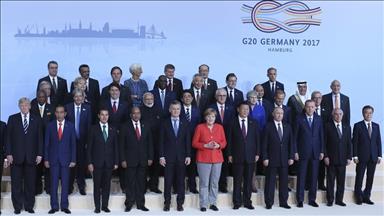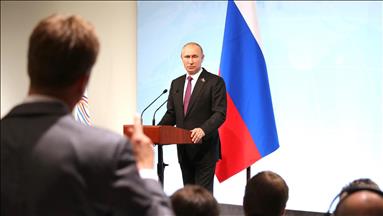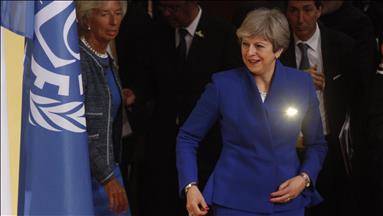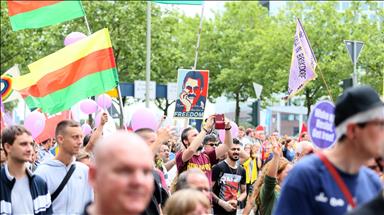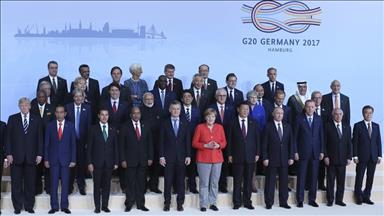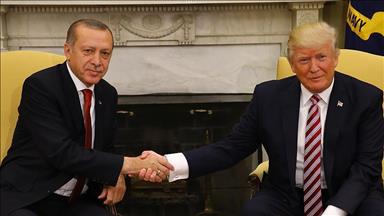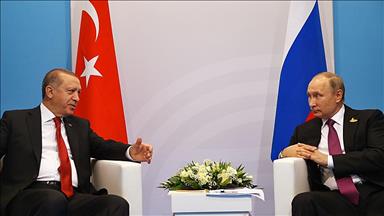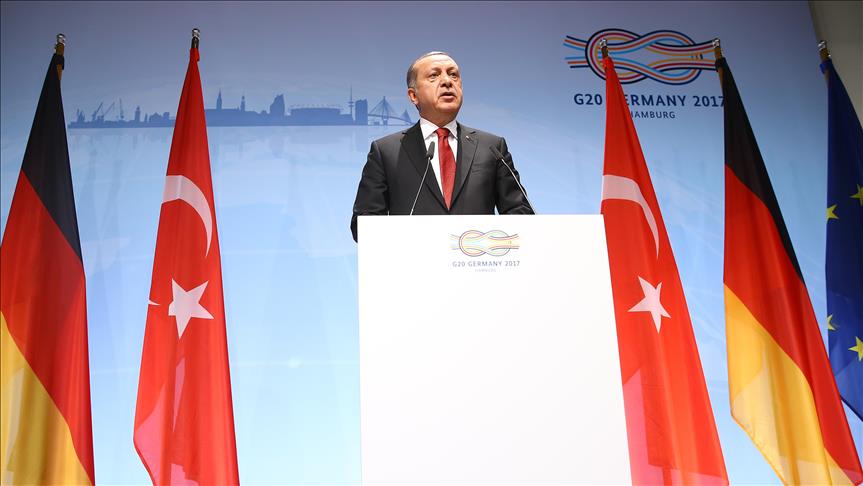 Turkish President Recep Tayyip Erdogan holds a press conference after the G20 Leaders' Summit in Hamburg, Germany on July 08, 2017. ( Kayhan Özer - Anadolu Agency )
Turkish President Recep Tayyip Erdogan holds a press conference after the G20 Leaders' Summit in Hamburg, Germany on July 08, 2017. ( Kayhan Özer - Anadolu Agency )
By Sorwar Alam
ANKARA
Turkish President Recep Tayyip Erdogan on Saturday emphasized the need for global action against terrorism saying that no region was safe from terror threats.
Speaking after the G20 summit in Hamburg, Germany, Erdogan said the international community needed to share the burden in the fight against terrorism.
“[At the G20 summit] We have emphasized on showing a principled, consistent and stable stance in the fight against globalized terrorism,” Erdogan said.
"I hope that this meeting will be a breaking point for our position of accepting [to designate] terror targets without regards for religion, ethnicity or language," he added.
He also spoke against the U.S. arming PYD/YPG terror groups in Syria in order to combat Daesh in Raqqah.
“We will never keep silent when support and arms are provided to terrorist organizations near our borders,” Erdogan said.
The PKK/PYD is part of the Syrian Democratic Forces (SDF) involved in the plan to capture Raqqah and has been supplied with U.S. arms.
Iraq unity
Ankara views the PKK/PYD, which is the Syrian branch of the PKK, as a terrorist group and fears weapons supplied to the PKK/PYD for the operation to oust Daesh from Syria's Raqqah will end up in the hands of PKK terrorists fighting Turkish security forces.
More than 1,200 people, including security force personnel and civilians, have lost their lives since the PKK -- listed as a terrorist organization by Turkey, the U.S., and the EU -- resumed its decades-long armed campaign in July 2015.
Erdogan also vowed that Turkey would not allow a Kurdish state in northern Syria and said he supported the unity of both Iraq and Syria.
“Iraq will be a strong country as long as it protects its unity,” Erdogan added.
He added that the referendum on the independence of the Kurdistan Regional Government (KRG) would not help Iraq in terms of peace.
In March, Kurdish Regional Government President Masoud Barzani held a meeting with UN Secretary General Antonio Guterres in Erbil during which he announced that within a short period of time a referendum would be held to decide the fate of the region.
He also addressed the western countries' stance regarding the Fetullah terrorist Organization (FETO), an illegal network accused of orchestrating last year’s coup attempt in Turkey.
Western countries, safe harbor for FETO
"Militants of the terror group who organized a deadly coup attempt on July 15 last year in my country and martyred 250 of my citizen and left 2,193 other wounded are seeing the Western countries as a safe harbor," he added.
According to the government, the coup on July 15, 2016, was organized by followers of U.S.-based Fetullah Gulen, who is accused of pursuing a long-running campaign to overthrow the government through supporters within the Turkish state, particularly the military, police and judiciary.
He added that protecting FETO terrorists who fled from Turkey were the gravest example of European states’ support to terror groups.
The Turkish president also criticized German authorities for preventing him earlier this week from addressing Turkish immigrants in Germany on the sidelines of the July 7-8 summit.
“Those who did not allow a democratically-elected president to address his people cannot talk about freedom of speech,” Erdogan said.
Representatives of Germany's 3-million-strong Turkish community were planning to host Erdogan at a public event. However, German opposition parties fiercely opposed his planned address, putting pressure on the government ahead of a general election in September.
Ties between Ankara and Berlin have been strained in recent months as Turkish officials slammed Germany for turning a blind eye to outlawed groups and terrorist organizations, while German politicians criticized Turkey over human rights and freedom of the press issues.
Qatar
“The PKK terrorist organization and its offshoots can collect tens of millions of euros in several European states every year”, Erdogan said.
On the ongoing Gulf crisis between Qatar and the Saudi-led block, Erdogan said Ankara expected a peaceful solution of the crisis.
“Turkey has brotherly relations with all Gulf countries and has used all diplomatic tools to resolve the Qatar crisis,” Erdogan added.
He noted that Turkey did not approve sanctions against Qatar amid troubles in region.
“As I mentioned before, there won't be any winners in the brothers' fight," Erdogan said calling on countries in the region, particularly Saudi Arabia, to resolve the issue in a short period of time.
The ongoing crisis in inter-Arab relations climaxed on June 5, when Saudi Arabia, the UAE, Bahrain, Egypt and Yemen all abruptly cut diplomatic relations with Doha, accusing it of meddling in their domestic affairs and supporting terrorist groups.
Mauritania followed suit shortly afterward, while Jordan downgraded its diplomatic representation in Doha.
Saudi Arabia also sealed its land border with Qatar, geographically isolating the tiny Gulf nation.
Solving disputes in Cyprus
Doha, for its part, strenuously denies that it is a supporter of terrorism, describing the moves to isolate it as “unjustified” and in breach of international law.
Erdogan also said Turkey would continue its efforts in solving disputes in the divided Mediterranean island of Cyprus.
“Despite our all efforts, the second session of the Cyprus conference, which began on June 28, remained inconclusive. Dedicated efforts, the friendly and modest attitude of Turkey and of the Turkish side were not met with the deserved response,” Erdogan said.
“We will continue to contribute to find a solution on the issue [...], and we expect the same from all sides,” he added.
Representatives from the EU, the Turkish and Greek Cypriot leaderships, and the guarantor nations of Turkey, Greece and Britain participated in the intense discussions that began at the end of last month. The negotiations ended without any result.
The Eastern Mediterranean island has been divided since 1974, when a Greek Cypriot coup was followed by violence against the island's Turks, and Ankara's intervention as a guarantor power.
Erdogan also called international community to take immediate action for the drought-affected people in east and southern Africa.
Drought in Africa
“I call on developed nations to act against the ongoing drought in Somalia, South Sudan, Ethiopia and Kenya,” he said.
“We cannot remain unresponsive to this human tragedy in which every day millions of people struggle with hunger and famine and come face-to-face with death.”
According to the United Nations and other aid organizations, more than 11 million people in East Africa are facing starvation with Somalia and South Sudan being the worst affected by drought and famine as conflict has made it hard for aid organizations to deliver food aid. The conflict has also made farming impossible.
Parts of Uganda and Ethiopia and Kenya are also being affected by the drought.



